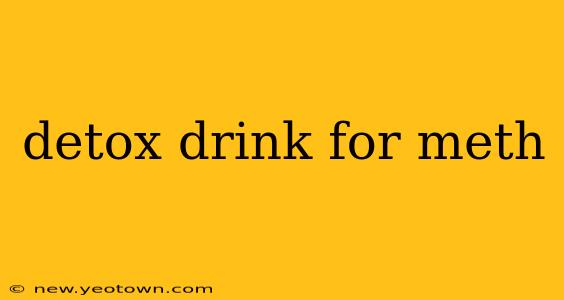Detoxing from Meth: Understanding the Process and Supporting Your Body
Methamphetamine, or meth, is a highly addictive stimulant that wreaks havoc on the body. Quitting meth is incredibly challenging, both physically and mentally, and requires professional support. While there's no magic "detox drink" that will instantly cleanse your system of meth, understanding the detoxification process and supporting your body through it is crucial. This article explores the realities of meth detox and offers information on how to navigate this difficult period safely and effectively. This information is not a substitute for professional medical advice. Always consult with a doctor or addiction specialist before attempting any detox plan.
What are the effects of methamphetamine on the body?
Methamphetamine's intense effects on the central nervous system lead to a range of serious physical and psychological consequences. These can include:
- Cardiovascular issues: Increased heart rate, high blood pressure, and even heart attack or stroke.
- Neurological problems: Damage to brain cells, leading to cognitive impairment, mood swings, and psychosis.
- Dental problems: "Meth mouth," characterized by severe tooth decay and gum disease.
- Gastrointestinal problems: Nausea, vomiting, abdominal pain, and constipation.
- Skin problems: Sores, infections, and skin picking.
- Sleep disturbances: Insomnia and fatigue.
Is there a specific detox drink for meth?
No, there isn't a single "detox drink" that will remove meth from your system. The process of eliminating meth from your body is complex and takes time. While some drinks might support general hydration and overall health, they cannot replace the crucial medical supervision necessary for a safe and effective meth detox.
What role does hydration play in meth detox?
Hydration is essential for overall health, and it can be particularly helpful during withdrawal. Methamphetamine is dehydrating, and rehydrating the body helps to alleviate some of the physical symptoms of withdrawal, such as headaches, fatigue, and muscle aches. Drink plenty of water, but avoid excessive amounts, which could lead to electrolyte imbalances.
What are the symptoms of meth withdrawal?
Meth withdrawal symptoms can vary greatly in severity and duration, depending on factors such as the length and intensity of meth use. They can include:
- Intense cravings: An overwhelming urge to use meth again.
- Depression and anxiety: Significant mood swings and feelings of hopelessness.
- Fatigue and sleep disturbances: Extreme tiredness, difficulty sleeping, or vivid nightmares.
- Irritability and aggression: Increased anger, hostility, and difficulty controlling emotions.
- Muscle aches and pains: Body aches and discomfort.
- Headaches and nausea: Physical symptoms of withdrawal.
How long does meth withdrawal last?
Meth withdrawal can be a lengthy and challenging process. The acute withdrawal symptoms typically last for several days to a few weeks, but the psychological cravings and other lingering effects can persist for much longer.
What is the best way to detox from meth?
The safest and most effective way to detox from meth is under the supervision of medical professionals in a medically assisted detox program. These programs provide support and medication to manage withdrawal symptoms, reducing the risk of relapse and other complications.
What kind of medical support is available during meth detox?
Medically assisted detox programs often provide:
- Medication to manage withdrawal symptoms: Medications can help ease cravings, anxiety, and other symptoms, making the detox process more manageable.
- Medical monitoring: Doctors and nurses constantly monitor vital signs and address any health complications.
- Therapy and counseling: Addressing the underlying psychological issues that contribute to addiction is crucial for long-term recovery.
Remember: Successfully detoxing from meth requires a holistic approach that includes professional medical guidance, therapy, and ongoing support. Don't attempt to detox alone. Reach out for help – your health and well-being are paramount. There are resources available, and recovery is possible.

